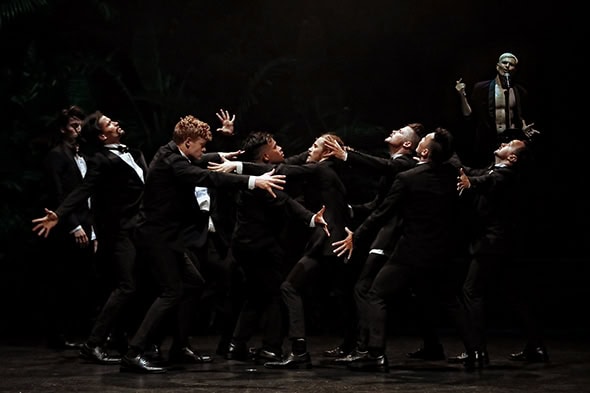Shaun Parker & Company’s Little Big Man in Ramallah
Posted: August 10th, 2019 | Author: Nicholas Minns | Filed under: Festival, Performance | Tags: Alex Warren, Damian Meredith, Harrison Hall, Imanuel Dabo, Ivo Dimchev, Joel Fenton, Josh Mu, King, Libby Montilla, Little Big Man, Penny Hunstead, Ramallah Contemporary Dance Festival, Robert Tinning, Samuel Beazley, Shaun Parker, Shaun Parker & Company, Toby Derrick | Comments Off on Shaun Parker & Company’s Little Big Man in RamallahShaun Parker & Company, Little Big Man, Ramallah Contemporary Dance Festival, April 5

What you see first in Shaun Parker’s Little Big Man at the Municipality Theatre in Ramallah City Hall is a fresh-faced, platinum blonde boy in baggy shorts and a maroon velvet jacket buttoned across his bare chest sitting casually with his legs dangling over the edge of the stage playing a small keyboard while humming and singing in a rich falsetto voice. The singer is in full control of his material and can improvise his words to include an invitation to latecomers to fill in the front rows; this is the inimitable singer/songwriter Ivo Dimchev. Finishing the song, he begins a new rhythmic introduction that the audience immediately accompanies with a hand beat. Dimchev stops, looks at the audience with a mixture of sternness and cheek and pulls one hand across his throat. The audience laughs and Dimchev resumes in silence. From that moment on he holds the entire audience within his grasp and the audience willingly accedes.
Parker, the artistic director and choreographer of Shaun Parker & Company, changed the name of his work from King to Little Big Man for the company’s tour of the Middle East where it was felt judicious to avoid any disrespect or misunderstanding in the Kingdom of Jordan. Little Big Man (as it shall be known here) references the Y chromosome that is present only in the male of the species and determines the sex of offspring. The all-male cast — Josh Mu, Toby Derrick, Libby Montilla, Imanuel Dabo, Joel Fenton, Samuel Beazley, Harrison Hall, Robert Tinning, Damian Meredith and Alex Warren — finds itself inexorably trapped inside its masculinity as if Parker has put his men on a glass plate under a microscope and is allowing us to watch the biological process unfold. Crystalline choreographic patterns and intricate timing suggest the workings of sentient organisms but the presence of ten men in dinner jackets performing under an ornate chandelier against Penny Hunstead’s lush backdrop of potted palm trees transports the organic to the social and, with the emergence of male aggression, from the social to the political; Little Big Man is a gently satirical but resolute reminder of the inherent violence in masculinity and by extension in our current system of patriarchy.
Parker is not the first choreographer to dissect male aggression, but in collaborating with Dimchev as composer and performer he presents an alternative running dialogue to masculinity that undermines it with the sensuality and beauty of androgyny. Dimchev is the catalyst for change; although he is on stage throughout the performance and remains aloof from the macho machinations around him, his presence weaves a spell on the ten men that by the end reduces them — and the audience — to emotional putty. Dimchev’s alchemy aside, Parker is careful not to caricature maleness too narrowly; the cast is sophisticated, charming, debonair and athletically accomplished, qualities we can easily admire. They lift, ride and leapfrog each other with childlike innocence, can scrum down with gentlemanly vigour and they explore homoerotic relations with candour. Parker strips them down to reveal their naked traits, and in the case of Derrick, his naked form as a focus of quintessential gender (for this tour full nudity has been scaled back to partial nudity). It is at this point that a spark of jealousy turns survival of the fittest into a self-fulfilling contest in which the biggest of the group picks on the smallest and smothers him. Violence erupts in the bonded cocks with head-butting and aggressive combat, all meticulously crafted, while Dimchev accompanies their antics with a beatific smile and lines like, ‘We’re living together’ and ‘Why do I love you?’ After a brief interlude in which the men disappear through the undergrowth where we can see them playing ritually, they return with more composure, collaboration and cooperation in an intricate choreographic layering of strength and softness until re-emerging traits of sadistic boot-camp behaviour result in a revolt, leaving two bodies on the stage. As the remaining men retreat around the ‘guardian angel’ of Dimchev, the victim gets up and lays his head on the body of his assailant: aggression turns to vulnerability in a monument to ambiguity.
Like any work of integrity, Little Big Man raises as many questions as it answers; it has taken Parker five years, working with sporadic grants, to achieve this level of integration between genetic and psychological material and a dance theatre form that alternately thrills and soothes; it indicates a rare form of inspired collaboration.